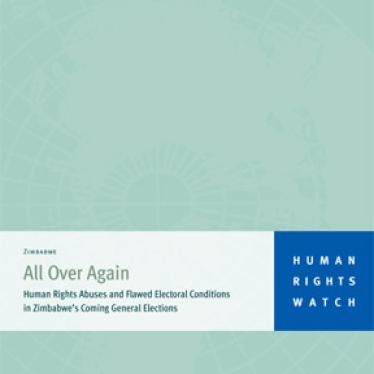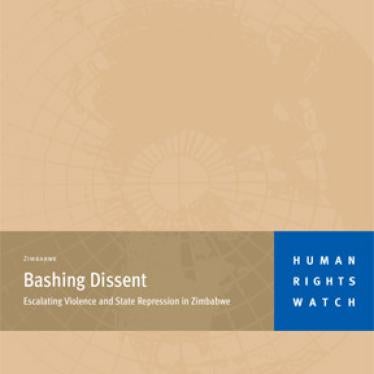(Johannesburg) - As Zimbabweans head to the polls in the country’s March 29 elections, serious electoral flaws and human rights abuses by the government undermine any meaningful prospect of free and fair elections, Human Rights Watch said today.
In a 59-page report, “All Over Again: Human Rights Abuses and Flawed Electoral Conditions in Zimbabwe’s Coming General Elections,” Human Rights Watch documents how the government and the ruling party ZANU-PF, in the run up to the 2008 elections, have engaged in widespread intimidation of the opposition; have restricted freedom of association and assembly; and have manipulated food and farming equipment distribution to gain political advantage. Human Rights Watch also documented biased media coverage in addition to numerous incidents of police and state-security violence against human rights activists and perceived opposition supporters throughout Zimbabwe. The report is based on research conducted over seven weeks across the country and in the capital, Harare.
“Despite some improvements on paper to the election regulations, Zimbabweans aren’t free to vote for the candidates of their choice,” said Georgette Gagnon, Africa director at Human Rights Watch. “While there are four candidates running for president and many political parties involved, the election process itself is skewed.”
Zimbabweans will vote in synchronized presidential, parliamentary, senatorial, and local elections, the first since changes to Zimbabwe’s constitution in 2007.
The Zimbabwean government claims that the elections are in line with the Guidelines and Principles Governing Democratic Elections agreed by the Southern African Development Community (SADC). Human Rights Watch called on international observers, in particular those from SADC in Zimbabwe, to monitor the elections and to judge the political context in which the elections are being held, not just the electoral process itself. SADC observers should publicly, promptly, and clearly condemn failures to uphold regional and international standards.
SADC’s post-election assessments of Zimbabwe’s last three elections were alarmingly positive despite the widespread human rights abuses and electoral irregularities that were documented by local and international organizations.
Previous presidential elections in 2002, which re-elected President Robert Mugabe, were characterized by violence and electoral malpractice, mostly by the ruling party Zimbabwe African National Union – Patriotic Front (ZANU-PF) and the state security forces. Similar flaws and violations were documented during parliamentary elections in 2000 and 2005.
After SADC named South African President Thabo Mbeki as mediator between the ruling party and the opposition Movement for Democratic Change (MDC) in March 2007, the South African government stated that one of its main objectives was to ensure credible elections in Zimbabwe, the outcome of which would not be contested. But the current repression in Zimbabwe shows that objective has not been met.
“The onus for reporting on violations in the 2008 elections rests with the observer mission and other African countries,” said Gagnon. “In the days remaining until the elections, they should urge the Zimbabwean government to allow electoral observers to visit all election sites and openly report on any election-related violence and intimidation.”
In spite of new provisions in Zimbabwe’s Electoral Laws Amendment Act banning intimidation and violence, Human Rights Watch documented numerous such incidents, mainly carried out by ruling party supporters and state security agents, between September 2007 and March 2008 in the areas visited.
On February 19, 2008 in Harare, a group of ZANU-PF supporters seized nine members of the Progressive Teachers Union of Zimbabwe (PTUZ) as they tried to distribute flyers for the organization’s “save our education” campaign. The ZANU-PF supporters took the teachers groups to ZANU-PF provincial headquarters in Harare, and beat them with iron bars, pieces of wood, and pieces of furniture for over an hour. One woman from the group was sexually assaulted.
A local activist from Makonde constituency in Mashonaland West province told Human Rights Watch about the intense intimidation of opposition supporters in his area. “The opposition MDC members are visited daily by ZANU-PF youth who shout and sing outside their homes,” he said. “They call them sell-outs and tell them they will deal with the MDC candidates after the elections.”
Despite also promising a “zero tolerance” approach to violence in the lead-up to the elections, state security agents and police have been involved in incidents of violence and intimidation against opposition members and human rights activists. On January 25, 2008, for example, police viciously beat and arrested 25 members of the organization Restoration of Human Rights Zimbabwe (RoHRZ) in Harare as they peacefully marched in protest against repressive legislation and police harassment of the opposition MDC. The police subjected the activists to cruel and degrading treatment, forcing them to crawl on the ground and eat their own shoes.
“It is appalling that the police who are supposed to prevent abuses are committing them,” said Gagnon. “The government’s failure to prosecute even one police officer or state security official responsible for such violence and intimidation has deepened the climate of fear in the country.”
The report also documents the government’s use of state-subsidized food and farming equipment as an electioneering tool. Human Rights Watch gathered more than 20 reports of government and ruling party officials using food and farming equipment to gain political advantage. Perceived political opponents of the ruling party or the government, including teachers, farmers and human rights activists have been denied access to food or farming equipment.
The use of food as a political tool was even confirmed by a ZANU-PF supporter in Manicaland province. She told Human Rights Watch, “The ‘mealie’ meal is only being accessed by us. It is very easy. Only those who are on the councilors lists can access the grain. A person who is not on the list cannot.”
While opposition parties have been able to hold rallies in many provinces around the country, including provinces that were previously “no go areas” for the opposition, police and local authorities have prevented many smaller opposition meetings from taking place.
Human Rights Watch documented that opposition candidates have found it almost impossible to access Zimbabwe’s state-controlled radio stations and television. For example, in the month of February 2008, state-owned television devoted five times more coverage to President Robert Mugabe and his ruling party than all the opposition combined.
The report also highlights serious flaws in the country’s electoral procedures, in spite of changes to electoral laws. The flaws include a chaotic and thus easily abused voter-registration process, disenfranchisement of voters, and an unprepared, under-resourced, and partisan electoral commission. Despite a new and complex voting process, voter education around the country has been extremely poor.
“If southern African leaders are serious about ending Zimbabwe’s political crisis, they need to tell the Zimbabwean government there will be consequences if it again flouts its commitment to hold free and fair elections,” said Gagnon. “Another round of flawed elections in Zimbabwe should not lead to ‘business as usual.’”








